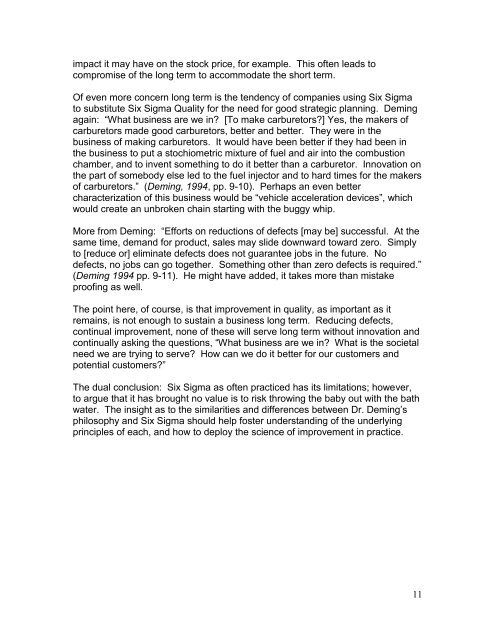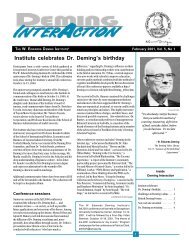Six Sigma, Through The Lens Of Dr. Deming's Philosophy And
Six Sigma, Through The Lens Of Dr. Deming's Philosophy And
Six Sigma, Through The Lens Of Dr. Deming's Philosophy And
You also want an ePaper? Increase the reach of your titles
YUMPU automatically turns print PDFs into web optimized ePapers that Google loves.
impact it may have on the stock price, for example. This often leads to<br />
compromise of the long term to accommodate the short term.<br />
<strong>Of</strong> even more concern long term is the tendency of companies using <strong>Six</strong> <strong>Sigma</strong><br />
to substitute <strong>Six</strong> <strong>Sigma</strong> Quality for the need for good strategic planning. Deming<br />
again: “What business are we in? [To make carburetors?] Yes, the makers of<br />
carburetors made good carburetors, better and better. <strong>The</strong>y were in the<br />
business of making carburetors. It would have been better if they had been in<br />
the business to put a stochiometric mixture of fuel and air into the combustion<br />
chamber, and to invent something to do it better than a carburetor. Innovation on<br />
the part of somebody else led to the fuel injector and to hard times for the makers<br />
of carburetors.” (Deming, 1994, pp. 9-10). Perhaps an even better<br />
characterization of this business would be “vehicle acceleration devices”, which<br />
would create an unbroken chain starting with the buggy whip.<br />
More from Deming: “Efforts on reductions of defects [may be] successful. At the<br />
same time, demand for product, sales may slide downward toward zero. Simply<br />
to [reduce or] eliminate defects does not guarantee jobs in the future. No<br />
defects, no jobs can go together. Something other than zero defects is required.”<br />
(Deming 1994 pp. 9-11). He might have added, it takes more than mistake<br />
proofing as well.<br />
<strong>The</strong> point here, of course, is that improvement in quality, as important as it<br />
remains, is not enough to sustain a business long term. Reducing defects,<br />
continual improvement, none of these will serve long term without innovation and<br />
continually asking the questions, “What business are we in? What is the societal<br />
need we are trying to serve? How can we do it better for our customers and<br />
potential customers?”<br />
<strong>The</strong> dual conclusion: <strong>Six</strong> <strong>Sigma</strong> as often practiced has its limitations; however,<br />
to argue that it has brought no value is to risk throwing the baby out with the bath<br />
water. <strong>The</strong> insight as to the similarities and differences between <strong>Dr</strong>. Deming’s<br />
philosophy and <strong>Six</strong> <strong>Sigma</strong> should help foster understanding of the underlying<br />
principles of each, and how to deploy the science of improvement in practice.<br />
11



